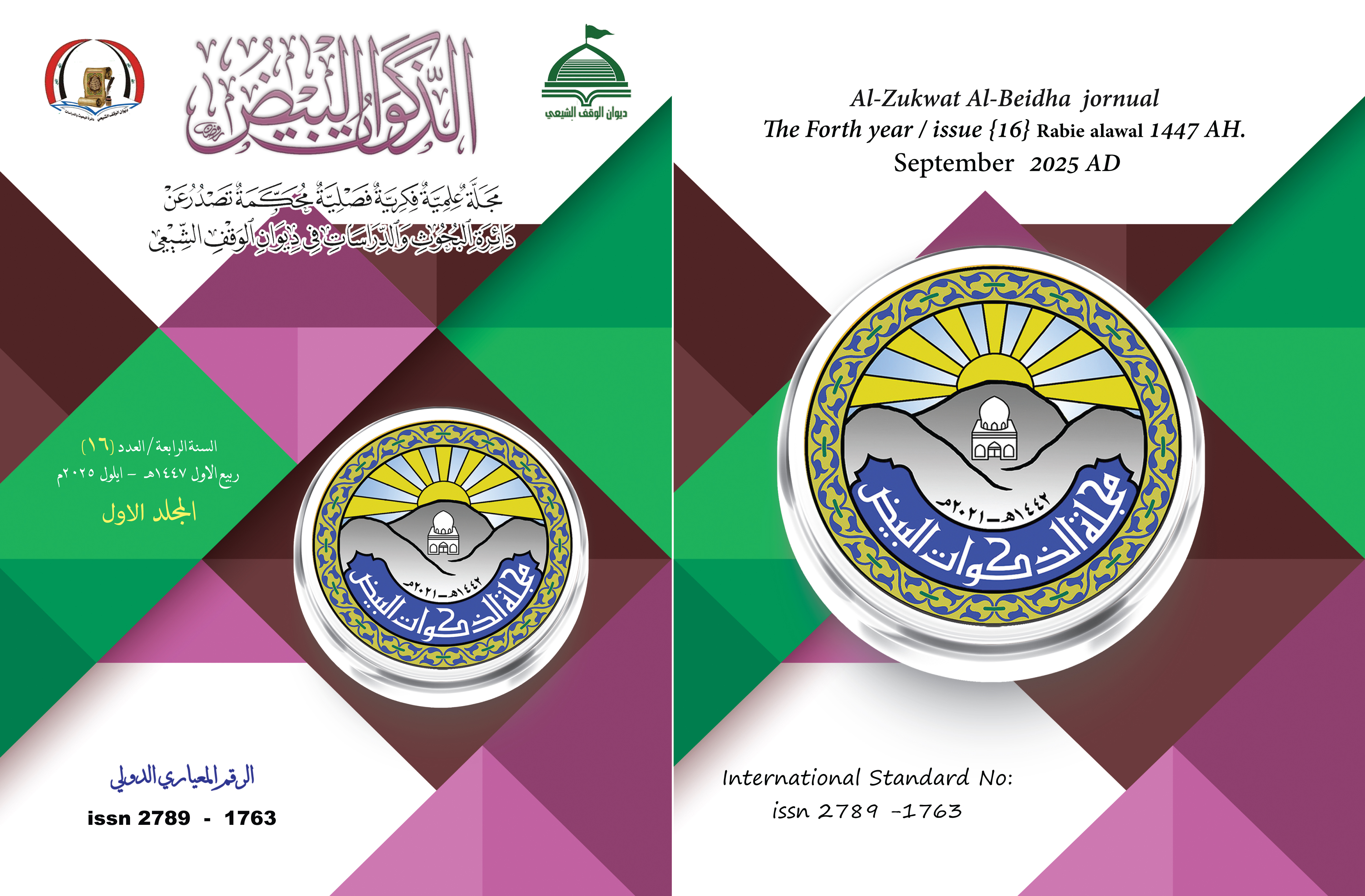Abstract
Abstract:
This research deals with the investigation and study of the thesis of Ismail bin Muhammad bin Mustafa Abu al-Fida al-Qunawi (d.1195AH), entitled (A Letter on the Refutation of the Objection to Al-Ghazali’s Statement: There is nothing more creative than what was possible).
This thesis discusses the objections raised regarding Imam Al-Ghazali’s famous statement: “Nothing is possible that is more perfect than what has been,” which has been a subject of controversy among scholars and philosophers. Some of them saw this statement as an attempt to deny God Almighty’s ability to create a world more perfect than this one. However, Al-Qunawi (may God have mercy on him) explained that what is meant by it is not to deny absolute divine power, but rather to point to a firmly established doctrinal principle, which is that God Almighty’s eternal knowledge is connected to the existence of the world in this most perfect manner and order.
Al-Qunawi (may God have mercy on him) explained that what Imam al-Ghazali meant was not related to the denial of power, but rather to the eternal divine knowledge being related to the occurrence of the world in the form it is in, such that it is impossible for anything other than that to occur after knowledge is related to it, even if it is possible in itself.
The research seeks to highlight the intellectual value of this text within the context of Islamic theology, and to clarify the accuracy of Imam Al-Ghazali’s distinction between intrinsic possibility and impossibility by others.
The investigation also studies the two approved manuscript copies of the thesis, compares their texts, and documents the sources on which the author relied.
This research deals with the investigation and study of the thesis of Ismail bin Muhammad bin Mustafa Abu al-Fida al-Qunawi (d.1195AH), entitled (A Letter on the Refutation of the Objection to Al-Ghazali’s Statement: There is nothing more creative than what was possible).
This thesis discusses the objections raised regarding Imam Al-Ghazali’s famous statement: “Nothing is possible that is more perfect than what has been,” which has been a subject of controversy among scholars and philosophers. Some of them saw this statement as an attempt to deny God Almighty’s ability to create a world more perfect than this one. However, Al-Qunawi (may God have mercy on him) explained that what is meant by it is not to deny absolute divine power, but rather to point to a firmly established doctrinal principle, which is that God Almighty’s eternal knowledge is connected to the existence of the world in this most perfect manner and order.
Al-Qunawi (may God have mercy on him) explained that what Imam al-Ghazali meant was not related to the denial of power, but rather to the eternal divine knowledge being related to the occurrence of the world in the form it is in, such that it is impossible for anything other than that to occur after knowledge is related to it, even if it is possible in itself.
The research seeks to highlight the intellectual value of this text within the context of Islamic theology, and to clarify the accuracy of Imam Al-Ghazali’s distinction between intrinsic possibility and impossibility by others.
The investigation also studies the two approved manuscript copies of the thesis, compares their texts, and documents the sources on which the author relied.
Keywords
divine power
eternal knowledge
Keywords: Al-Ghazali
philosophers
possibility and impossibility
Theology
Abstract
المستخلص:
يتناول هذا البحث تحقيق ودراسة لرسالة إسماعيل بن محمد بن مصطفى أبو الفداء القونوي (ت1195هـ)، الموسومة بـ(رسالة في اندفاع الاعتراض على قول الغزالي في: ليس في الإمكان أبدع مما كان).
تدور الرسالة حول مناقشة الاعتراضات المثارة حول عبارة الإمام الغزالي الشهيرة: «ليس في الإمكان أبدع مما كان»، والتي شكّلت موضع جدل بين العلماء والفلاسفة، فقد رأى بعضهم أن هذه العبارة تُوهم بنفي قدرة الله تعالى على إيجاد عالَم أكمل من هذا العالَم، غير أن القونوي (رحمه الله) بيّن أن المراد منها ليس نفي القدرة الإلهية المطلقة، بل الإشارة إلى أصل عقدي راسخ، وهو أن العلم الأزلي لله تعالى قد تعلّق بوجود العالم على هذا الوجه والنظام الأكمل.
وقد بيّن القونوي (رحمه الله) أن مراد الإمام الغزالي لا يتعلق بنفي القدرة، وإنما بتعلق العلم الإلهي الأزلي بوقوع العالَم على الهيئة التي هو عليها، بحيث يستحيل وقوع خلاف ذلك بعد تعلق العلم به، وإن كان ممكناً في ذاته.
إذ يسعى البحث إلى إبراز القيمة الفكرية لهذا النص ضمن سياق علم الكلام الإسلامي، وإيضاح مدى دقة تمييز الإمام الغزالي بين الإمكان الذاتي والامتناع بالغير.
كما يقوم التحقيق بدراسة النسختين الخطيتين المعتمدتين للرسالة، وإجراء المقابلة بين نصوصهما، مع توثيق المصادر التي استند إليها المؤلف.
يتناول هذا البحث تحقيق ودراسة لرسالة إسماعيل بن محمد بن مصطفى أبو الفداء القونوي (ت1195هـ)، الموسومة بـ(رسالة في اندفاع الاعتراض على قول الغزالي في: ليس في الإمكان أبدع مما كان).
تدور الرسالة حول مناقشة الاعتراضات المثارة حول عبارة الإمام الغزالي الشهيرة: «ليس في الإمكان أبدع مما كان»، والتي شكّلت موضع جدل بين العلماء والفلاسفة، فقد رأى بعضهم أن هذه العبارة تُوهم بنفي قدرة الله تعالى على إيجاد عالَم أكمل من هذا العالَم، غير أن القونوي (رحمه الله) بيّن أن المراد منها ليس نفي القدرة الإلهية المطلقة، بل الإشارة إلى أصل عقدي راسخ، وهو أن العلم الأزلي لله تعالى قد تعلّق بوجود العالم على هذا الوجه والنظام الأكمل.
وقد بيّن القونوي (رحمه الله) أن مراد الإمام الغزالي لا يتعلق بنفي القدرة، وإنما بتعلق العلم الإلهي الأزلي بوقوع العالَم على الهيئة التي هو عليها، بحيث يستحيل وقوع خلاف ذلك بعد تعلق العلم به، وإن كان ممكناً في ذاته.
إذ يسعى البحث إلى إبراز القيمة الفكرية لهذا النص ضمن سياق علم الكلام الإسلامي، وإيضاح مدى دقة تمييز الإمام الغزالي بين الإمكان الذاتي والامتناع بالغير.
كما يقوم التحقيق بدراسة النسختين الخطيتين المعتمدتين للرسالة، وإجراء المقابلة بين نصوصهما، مع توثيق المصادر التي استند إليها المؤلف.
Keywords
الكلمات المفتاحية: الغزالي، علم الكلام، الفلاسفة، القدرة الإلهية، العلم الأزلي، الإمكان والامتناع.
